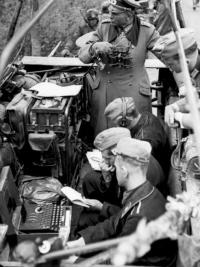
 For Lara, the fact she was leaving her husband wasn’t so bad as the bus being late.
For Lara, the fact she was leaving her husband wasn’t so bad as the bus being late.
The deep blue hues in the sky were fading in the east. A single wispy cloud floated above, tinted black in the January night. The morning star glittered, watching her. She dragged her coat tight around her slim frame against the chilling wind.
Distant shimmering lights led to the nearby train station. The glow seeped through the morning mist around the platform. A few figures stood waiting to catch early trains like freezing caricatures from a Lowry painting.
The painting … the painting had been the final nail in the coffin of her relationship with Michael. It seemed petty now. Even now, despite her desperation, despite her fear, her resolve had almost broken. She could still return before he woke and he would be unaware of her intentions.
But nothing would have changed except her diminishing self-esteem. He’d continue tormenting her and she might never again find the strength to leave.
She could, of course, catch a train from here. An early commuter train would take her to Birmingham, or to London. From there she could travel to anywhere in the country; hell, she could get to Europe if she wanted.
A man walked past with a dog, which sniffed at her holdall. The owner grunted a ‘good morning’. He dragged the dog away, not looking at her.
The light bleeding across the sky had eclipsed the morning star; the clouds were tinged with salmon. The concealing darkness was exposing her to the terrors of the day.
She stared at the Lowry caricatures again, wondering if they could see her, as she saw them. She should have taken off her glasses before she started, then she wouldn’t have known about them: blissfully ignorant in blindness.
She removed the glasses, carefully folding the arms down. She could see clearly enough without them, but in this half-light, distant things became blurred.
If eyes are the windows to the soul, I don’t want anyone looking into mine.
Without her glasses, the world blended into an anonymous blur of colours. She only needed the glasses for driving and reading, but tiredness had enveloped her and the world faded away to a hazy nothingness.
If I ever leave my husband again, I’ll go when I’m less tired.
But there wouldn’t be a next time, she thought, unconsciously crossing her fingers. Standing here, waiting for the bus, marked the end of that relationship. And all the time, her father’s quotation from Twelfth Night on the day she had announced her engagement, rang in her mind: Many a good hanging prevents a bad marriage. Had he seen something wrong in their relationship when she had been blinded by love?
And it wasn’t even a nice painting, she reminded herself. But Michael had decided it suited the bedroom wall and, because Michael was always right, it had gone up. Six months later, it had fallen down again. Gravity had chosen five o’clock in the morning to remove the painting from its seat of glory. The ensuing argument had forced her to the end of her tether: Michael had found a way of making it her fault. Already, she had been unconsciously planning her escape. Now, less than twenty-four hours later, she had walked out. Her heart had hardened, even though she was still brushing tears away.
And even though she was devastated by grief because everything had ended, and she was crushed by the uncertainty of the future, there was another, stronger, overwhelming emotion.
Relief.
She glanced over her shoulder. The rising sun paled in the mist. Even without her glasses she recognised the familiar landmarks of ‘home’: the river Welland and the bridge, the wooden archway of the George, the yellow limestone and timber-framed buildings. She needed to leave them all behind her now.
Shivering, she realised her teeth were gritted. She tapped her foot in irritation, praying the bus would arrive soon.
She looked back at the train station. Her first awareness that something was wrong was pure instinct. It was the same pervading fear that ate into her gut when she heard the key scraping in the lock as Michael came home from work. The sensation was so familiar that, at first, she thought he had found her, that he had woken early, found her note and had come to drag her back.
A movement, almost imperceptible.
She put her glasses on again and looked down the bank, past the discarded shopping trolleys, to the train lines.
Swathed by the morning mist, she saw a figure standing, Christ-like, arms outstretched, his overcoat hanging loose around him. Standing on one of the sleepers between the silver of the railway lines.
As she watched, he kneeled down, his arms suspended in a parody of the Crucifixion: resigned to his fate.
Categories:
0 comments on this article







